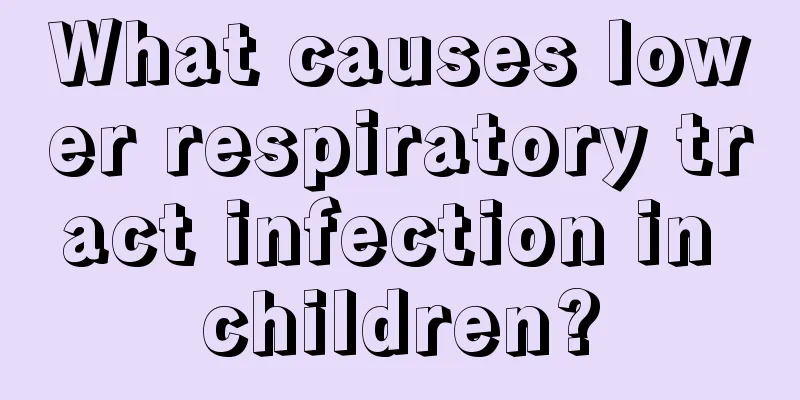Is it okay for baby teeth to grow on top first?

|
A baby is the future and hope of a family. Nowadays, many parents dote on their children even more, fearing that the baby will melt if they hold it in their mouths or fly away if they hold it in their hands. Some parents will record every detail of their baby’s daily life as a precious memory for the future. Many parents pay close attention to every little change in their baby. For example, some people have heard that it is better for the baby's teeth to grow first on the bottom and think that the order is very important. So is it true that the baby's teeth grow first on the top and then on the bottom? This situation varies from person to person, but most babies grow the two lower front teeth first. Of course, some babies grow the two upper front teeth first, so either way it does not affect the child's health. The order of tooth eruption is a statistical law, and there are individual differences. Each person has his or her own physiological eruption age. Generally speaking, the eruption time can vary within 8 or 9 months to one year, especially for infants and young children. We believe that the eruption of the first deciduous tooth within 1 year old and the eruption of all deciduous teeth within 3 years old should be within the normal physiological range. Generally speaking, the lower teeth grow first. In fact, it doesn't matter whether the upper teeth grow or the lower teeth grow. It will not affect the baby's growth and development, nor will it affect the baby's health. Don't worry. Suggestions: You should maintain a good attitude, feed your baby properly, add complementary foods appropriately, strengthen nutrition, do more outdoor sports, get more sun, keep warm, and prevent colds. I wish your baby grows up healthily! Under normal circumstances, baby's deciduous teeth begin to erupt at 4-10 months old and are fully grown at 2 to 2.5 years old. Teething is a long physiological process. As long as the baby does not suffer from rickets or malnutrition, there is no need to worry. Pay attention to dietary nutrition, especially calcium, phosphorus and vitamin supplements; keep your mouth clean. Do not eat anything too hard. Do not eat snacks before bedtime. Do more outdoor activities. Get more sun. You can also go to the hospital to test your baby's trace elements. The eruption of children's teeth varies greatly from person to person, some are earlier, some are later, but for a certain child, it is normal. For children with early tooth eruption, the lower incisors may begin to erupt at more than 4 months; most children begin to erupt at 6 to 8 months; and a small number of children begin to erupt after 1 year old, and some children do not erupt until they are nearly 1 and a half years old. But for these children, if there is no systemic developmental abnormality, it is normal. Suggestions: Although some children's teeth start to erupt early, some start to erupt late, and although there is always a certain order for the eruption of teeth, not all children will erupt in this order. Sometimes the order of eruption will change slightly, which is also within the normal range. Whether it is upper teeth or lower teeth, the time and order of eruption will change. According to the normal order of teeth eruption, the lower teeth should erupt first, followed by the upper teeth. However, due to individual differences in babies, the order of teeth eruption can be reversed and the teeth may not erupt in order, which will not affect the baby's future dental condition. Suggestions: It is recommended to give your baby some foods such as teething sticks to help him improve his chewing function. Don't worry about the order in which teeth come out. The growth time and order of children's teeth: Generally speaking, the development of teeth can be divided into three periods, namely the growth period, calcification period and eruption period. Teething at 6 months is only the eruption period of tooth development. This complex process is not found in other organs of the body. For example, organs such as the liver and heart only have a growth period, while the skeletal system has two periods: growth and calcification. However, teeth not only need to calcify, but also need to erupt in order to perform their functions. These three steps are indispensable. Specifically, it is: the occurrence of tooth germ, the formation of tooth tissue and the eruption of teeth. The development of tooth germs begins in the sixth week of embryogenesis, and 20 deciduous tooth germs gradually appear. While the deciduous tooth germs continue to develop, 20 permanent tooth germs grow from the lingual side of the deciduous tooth germs. In the future, they will develop into 20 permanent teeth and replace the deciduous teeth. The first, second, and third permanent molar germs grow at both ends of the permanent tooth germ in the tenth month of the embryo, two years after birth, and five years after birth, respectively. At this point the development of the tooth germ is complete. Tooth formation, eruption and tooth germ development is a continuous dynamic process. From the time the tooth tip breaks through the mucosa and enters the oral cavity to the time it completely bites into the opposing tooth, this period of time is most likely to cause dental occlusion abnormalities. Because during this period, the tooth roots have not yet been fully formed, the periodontal attachment is not firm, and the alveolar bone is relatively loose and easily affected by external forces. Habits such as sucking fingers and biting lips can cause teeth to shift and become deformed. If malocclusion has already occurred, it must be corrected during childhood, otherwise the effect will not be ideal. As children grow older, the number, size and strength of the periodontal tissues of their deciduous teeth can no longer adapt to the growing jaws and enhanced chewing power. The deciduous teeth begin to fall out physiologically at the age of 6, and are completely replaced by permanent teeth by around the age of 12. |
<<: Can babies eat lotus root?
>>: Children grow new teeth without losing old teeth
Recommend
What should I do if my child is frightened and has a fever?
Because children are unfamiliar with things in th...
A comprehensive explanation of the white spots on the forehead of newborns
Babies are the apple of every parent's eye. N...
One month old baby enteritis symptoms
A one-month-old baby has a very weak stomach and ...
How to treat chronic rhinitis in children?
Children's chronic rhinitis may be caused by ...
Three-year-old baby with stuffy nose
If nasal breathing is blocked, people will breath...
What should I do if my child has pharyngitis and cough?
Pharyngitis is a common disease. When people talk...
What is Kawasaki disease in children?
Many people have not heard of Kawasaki disease, n...
How is the dosage of medication for children calculated?
All medicines are poisonous, so the dosage must b...
What should I do if my baby lacks zinc, iron and calcium?
When my baby was eating, I found that he only ate...
Can meningitis be detected by blood test?
Many parents are very angry when their children a...
How many times a day is normal for a baby to poop?
The birth of a baby brings joy to countless famil...
When do baby dimples appear?
Many people have dimples when they smile, but som...
Baby's nose is humming but there is no snot
It is not easy for anyone to grow up from childho...
What to do if a 1-year-old child has diarrhea and vomiting
Every change in the baby after birth is watched b...
What to do if your child has insomnia at night, mothers should know
Nowadays, not only adults are under great pressur...









